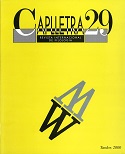La «narrativización» del discurso y el «efecto omnisciente» en no ficción periodística
DOI:
https://doi.org/10.7203/caplletra.29.4976Keywords:
«narrativització», estilística, discurs, narrador, «efecte omniscient» Abstract
Abstract
This article shows how the narrator can tell more than what the journalistic nonfiction orthodoxy dictates. By way of narrating a source’s speech, the narrator can report states of consciousness –i.e., feelings, thoughts, perceptions– as it happens in novels that have what is commonly known as omniscient narrators. Although this has never been studied thoroughly, it is a frequent practice in successful nonfiction texts.
 Downloads
Downloads
Downloads
Published
How to Cite
-
Abstract332
-
PDF (Català)221
Issue
Section
License
Authors submitting work to Caplletra for publication must be the legitimate holder of the usage rights. Legitimacy for the purposes of publishing the work must also include images, tables, diagrams and any other materials that may complement the text, whether they are the author of such material or not.
Copyright: on publishing their work in the journal, the author grants Caplletra. Revista Internacional de Filologia usage rights (reproduction, distribution and public communication) for both the paper printed version and for the electronic version.
All work published in Caplletra is covered by the Creative Commons license type Attribution-NonCommercial-NoDerivatives 4.0 (CC BY-NC-ND 4.0).
RESPONSABILITY
Caplletra. Revista Internacional de Filologia does not necessarily identify with the points of view expressed in the papers it publishes.
Caplletra. Revista Internacional de Filologia accepts no responsibility whatsoever for any eventual infringement of intellectual property rights on the part of authors.






